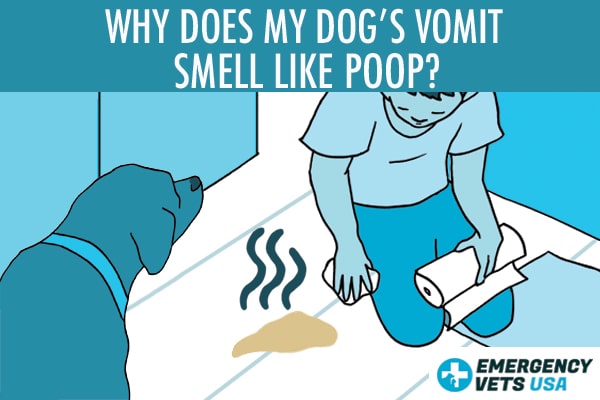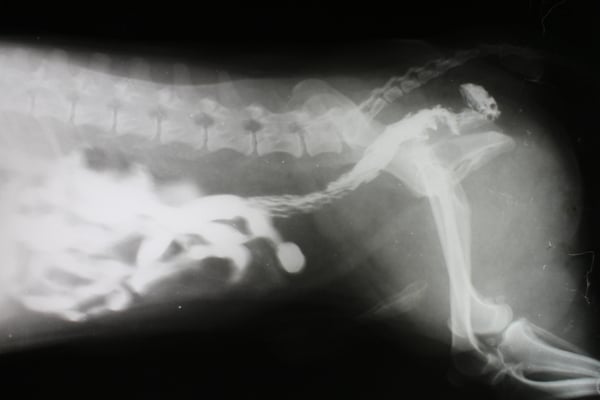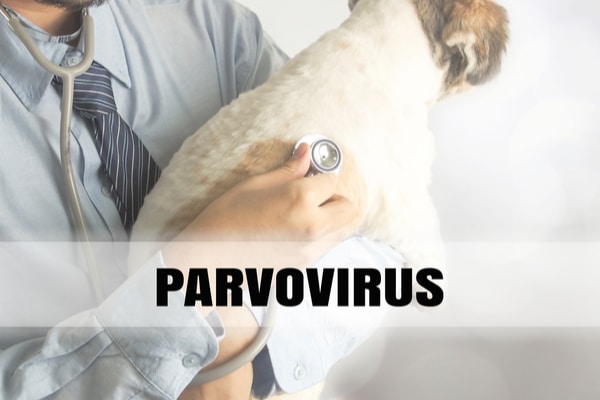Why Does My Dog’s Vomit Smell Like Poop?
Our canine companions can experience an upset stomach from time to time.
While vomiting in our furry friends can be worrisome enough, dog vomit that smells like poop should warrant an immediate trip to the vet.
So what can cause a dog’s vomit to smell foul?
In this article we will discuss the possible causes of horrible smelling vomit in dogs, and what this can mean for your furry friend.
Causes of Horrible Smelling Dog Vomit

Just as there are many things that can cause gastrointestinal upset in our dogs, there are a few possible causes of foul smelling vomit as well.
Dog vomit will not have a pleasant smell, as it is just a combination of bile and digested food.
However, dog vomit should never be pungent enough that it is considered shocking.
To help you better understand why your dog’s vomit smells so terrible, let’s dive into the most common causes below.
Eating Poop
If your dog’s vomit smells like poop, there is always a chance that they have consumed their own stool.
Our dogs are scavengers, causing some to pick up and consume anything that catches their eye.
Not only is their poop readily available in their yard, but it can even smell like the digested food that they eat each day.
The urge to consume their own poop is referred to as coprophagia, and it plagues a large amount of our furry friends.
Not only can a dog be interested in eating their own feces, but they may be drawn to other animal’s poop as well.
The great outdoors are filled with critters of all kinds, many of which leave their stool behind for a dog to stumble upon.
This can be seen as a new and exciting snack for your dog, causing them to dive right in.
This is also a common behavior for dogs that live with cats, as many pups are drawn to the scent of the litter box.
Some dogs are so interested in the poop within the litter box that their cat has left behind.
Pet parents have to find a way to block them off from it completely. If your dog is interested in eating feces, they may snatch it up any chance they get.
Not only is coprophagia a disgusting habit, but it can cause serious GI upset in our beloved companions.
Stool can be filled with bacteria, intestinal parasites, and other contaminants that can wreak havoc on their digestive health.
This is why some dogs that eat poop will vomit soon after, causing their vomit to smell especially foul.
If your dog is known to consume poop, this may be the cause behind their pungent vomit.
They Ate Something Foul
As we mentioned above, our dogs are scavengers that like to eat many of the strange things they come across.
Our pups are unaware of what can cause them harm, leading them to consume whatever catches their eye, no matter how disgusting it may be.
An overpowering odor may be just enough to draw our pups in, leading to a disgusting smell if they happen to vomit after they consume it.
For example, many dogs are attracted to the smell of dead animals.
A bird carcass may be impossible for your dog to resist, causing them to eat the remains during their scavenging.
These remains are often filled with bacteria, causing a dog to vomit in the hours after they consume it.
The remains of a dead animal can smell terrible, causing their vomit to smell as well.
Intestinal Obstruction

One of the more serious causes of terrible smelling vomit in dogs is due to intestinal obstructions or foreign bodies.
Dogs are known to eat things they should not, causing inedible objects to become trapped in their stomach or intestines.
When these foreign bodies (foreign objects) become trapped in the digestive tract, this causes digested food and intestinal matter to build up, unable to move past the blockage.
When the contents of the digestive tract are unable to move past a blockage, this causes a dog to vomit.
The intensity of the smell of the vomit will range based on how long the dog has had the obstruction, getting more foul as time goes on.
If an intestinal obstruction is left untreated, this will cause serious damage to the intestines around the blockage.
This can also cause foul smelling vomit, as the contents of these areas have been unable to pass for some time.
An intestinal obstruction requires immediate veterinary attention, as this will be fatal if left untreated.
The treatment of a foreign body in dogs can range from hospitalization on IV fluids to life saving surgery to remove the blockage, varying based on how long the obstruction has been present.
If your dog ever has vomit that is overpowering, the possibility of an obstruction is on the table.
Parvovirus

If you have ever been around a dog with parvovirus, the smell of their stool is seared in your memory.
Not only can parvo cause an unforgettably pungent smell in their diarrhea, but it can cause strong smelling vomit as well.
Parvovirus viciously attacks a dog’s intestinal tract, leading to an array of smelly gastrointestinal complications.
While parvovirus can affect other parts of the body, it mainly impacts the lining of the intestines and some blood elements.
The two factors together cause a dog to experience foul or bloody diarrhea and vomiting, along with systemic infection in severe cases.
As you can imagine, severely damaged intestinal lining can cause their vomit to have a strong odor.
Because canine parvovirus causes such severe GI upset, many dogs will die without immediate medical care.
The best chance at beating parvo involves aggressive hospitalization and supportive care, as well as early detection of the virus.
If your dog is not fully vaccinated against parvo and is having smelly vomit, we suggest seeing your veterinarian immediately.
Intestinal Bleeding & Ulcers
Blood in the digestive tract can cause a strong odor when a dog vomits.
Our furry friends can fall victim to an array of complications that damage the digestive tract, often leading to bloody vomit or diarrhea.
Any bleeding within the stomach or intestines can make a dog extremely nauseous, causing frank or digested blood to be present in the vomit.
The presence of blood is not only extremely alarming to pet parents, but may bring along an abnormal smell as well.
Intestinal bleeding in dogs can be a result of bleeding ulcers, ulcerated masses, ingestion of toxic substances, and any other occurrence that can damage the digestive tract.
If you think your dog may have blood in their vomit, it is important to contact your vet immediately for further care.
What Causes Brown Vomit In Dogs?
As mentioned in our dog vomit color guide, brown dog vomit can point to a few different things.
Ranging from the dye in their kibble to their poop eating habits, this vomit color may not offer a simple answer.
To help you get to the bottom of your dog’s brown vomit, let’s list the possible causes below.
Some of the most common factors behind brown vomit in dogs include:
- Their kibble contains brown or dark red colored dye
- They have been eating poop
- There is blood present in their vomit
- They have been eating dirt
- They ate something they should not have
If your dog is having brown colored vomit that has a terrible odor, it is best to seek further care from your veterinarian.
What To Do If Your Dog’s Vomit Smells Horrible
If your dog’s vomit smells horrible, the best thing to do is quickly assess the possibilities.
Think about the factors we discussed above, and if any of these reasons are possible for your furry friend.
By doing this, you can better report the issue to your vet for the best chance at a swift and full recovery.
No matter what, we always suggest contacting your veterinarian if your dog’s vomit smells foul.
While they may just be eating poop, they could be experiencing a serious medical complication that needs to be addressed.
Vomiting can quickly lead to dehydration, making it important to treat whether it smells bad or not.
If you ever have a vomiting pup on your hands, it is always best to seek professional care.
How To Prevent Vomiting In Your Dog
Vomiting in dogs is always a symptom of a bigger issue.
Because of this, there are many ways to prevent vomiting by implementing a few safety protocols throughout your home.
Some of the best ways to prevent vomiting in your dog include:
- Keep trash cans away from your dog at all times, or in an area they cannot access. Make sure they don’t eat plastic which usually has leftover food
- Avoid offering them table scraps or greasy food that can upset their stomach
- Keep your dog fully vaccinated at all times
- Pick up stool regularly in your yard if your dog is known to eat poop
- Check your yard and home for any potential dangers or objects they could consume
- Only offer chew safe toys, especially if your dog is known to destroy plush toys
- Keep your dog away from dogs that appear ill
- Keep any potential toxins out of your dog’s reach in your home, including batteries.
Final Thoughts
As you can see, there are a few potential factors behind terrible smelling vomit in dogs.
If your dog’s vomit smells like poop, then a trip to your local veterinarian’s office might be needed.
Be sure to review the information we discussed above so you can better understand your furry friend going forward.

My name is Amber. I am a dedicated animal lover that turned my passion into my career. I am a Licensed Vet Tech with 12 years of experience in veterinary medicine, but I recently took my career online to help spread accurate information on animal care. With how vast the online world is, I have a strong desire to ensure that the reader always walks away with helpful pet advice. With the experience I’ve gained from my time in this field, I have been able to travel the world, offering my services to as many animal rescues as I can find. If I am not at my laptop, or back home visiting family, you can find me somewhere in the world, cuddling every furry friend that I can find! More About Us
